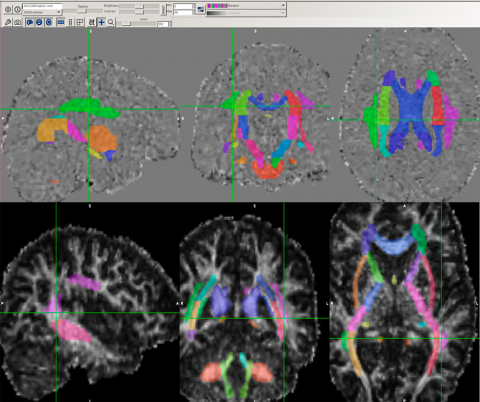Language, Music and Dementia (2021-2022)
The question of how language and music are represented in the human brain is one of the more challenging problems of contemporary cognitive neuroscience and neurolinguistics. During the past two decades, advances in neuroimaging technology have produced a greater understanding of higher cognition, including language and music.
This multiyear project team has been combining behavioral and neuroimaging research on language and music to establish the language and music mappings in professional musicians who are either monolingual or multilingual, and to examine the effect of musical training and multilingualism on dementia and cognitive impairment.
Building on the work of previous teams, the 2021-2022 team explored the short- and long-term effects of the COVID-19 pandemic on persons who are involved in music and multilingualism in different communities and levels of interaction. Team members also continued to hone their semi-structured interview process for collecting behavioral data for fMRI studies to understand the interactions and interrelations of neurological regions that are critical for linguistic and musical processing; the similarities and differences in the audition and reading of musical and linguistic texts; and the potential impact of musicianship and multilingualism on behavior in those with cognitive impairment and delaying the behavioral symptoms of dementia.
Learn more about this project team by viewing their lightning talk at the 2022 Fortin Foundation Bass Connections Showcase.
Timing
Fall 2021 – Spring 2022
Team Outputs
Edna Andrews, Alexandria Swaine. 2022. "Diversity and Inclusion in EEG Protocol Design and Recruitment." Glossos.
Hannah Folks, Caroline Gamard, Hope Morales, Devika Naphade, Krishna Sinha, Hanna Stern, Lena Yannella. 2021. Best Practice in Collecting and Encoding Behavioral Data for Analysis in fMRI Studies of Multilingualism and Musicianship.
Language, Music and Dementia (Audrey Costley, lightning talk at Fortin Foundation Bass Connections Showcase, Duke University, April 13, 2022)
This Team in the News
Making the Most of Duke, Summer 2021
Senior Spotlight: Reflections from the Class of 2023
See related teams, Language, Music and Dementia (2022-2023) and Language, Music and Dementia (2020-2021).
Image: Diffusion tensor imaging of the brain, courtesy of the 2019-2020 project team

Team Leaders
- Edna Andrews, Arts & Sciences-Slavic and Eurasian Studies;Program in Linguistics
- Cyrus Eierud, Arts & Sciences-Program in Linguistics
- Neema Sharda, School of Medicine-Medicine: Geriatrics
/undergraduate Team Members
-
Arushi Bhatia, Computer Science (BS)
-
Audrey Costley, Public Policy Studies (AB)
-
Caroline Gamard, Psychology (BS)
-
Matthew Greenwald, Biology (BS)
-
Paul Kim, Biology (BS)
-
Anika Pawlak, Program II (BS)
-
Sebastian Sanchez, Neuroscience (BS)
-
Nicole Schwenk, Neuroscience (BS)
-
Chester Tyson V, Neuroscience (BS)
-
Katherine Wang, Neuroscience (AB)
-
Nina Zhang, Neuroscience (BS)
/yfaculty/staff Team Members
-
Todd Harshbarger, School of Medicine-Brain Imaging and Analysis Center
-
Catherine Lewis, Arts & Sciences-Slavic and Eurasian Studies
-
Yana Lowry, Duke Focus Program
-
Andrew Michael, Duke Institute for Brain Sciences
